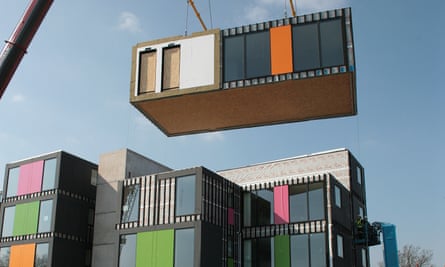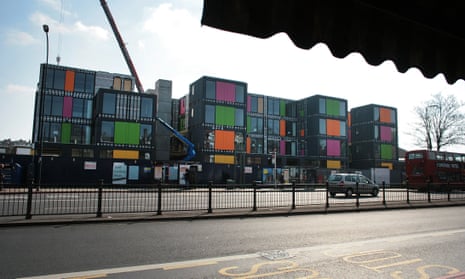The UK’s first pop-up village in south-east London, which houses 24 formerly homeless families, is a novel attempt at helping tackle Britain’s housing crisis and will serve as a blueprint for factory-made accommodation across the capital and in other cities.
The 96 residents of the brightly coloured Ladywell development in Lewisham previously lived in B&Bs or private rented accommodation and started moving in from August after it was built in eight months.
Mariatu Turay moved from a noisy flat above a 99p store on the main shopping street in Catford with her two daughters. She said her new home was far nicer and quieter than where she lived before.
The Ladywell flat costs Turay £1,061 a month. She is able to pay the rent since becoming a health science student at the University of East London.
Ceyda Eray previously lived in a damp house in Brockley with her two daughters, then aged nine and 14. “I went to the doctor and he gave them asthma pumps because my oldest one, when she was doing PE, after five to 10 minutes she was breathless, and my youngest one had eczema,” she said.
“But after we left that place she was fine and now she doesn’t have anything. No asthma pumps, no eczema creams, nothing.“My husband says: ‘I hope these flats stay and we’ll be there permanently.’”
The two-bedroom homes are temporary and will stay in Ladywell for up to five years while Lewisham council finalises its long-term plans for the area. They were designed by Richard Rogers’ architectural practice, Rogers Stirk Harbour + Partners (RSHP), which worked in partnership with the council, the construction company AECOM and insulation company SIG.
When the residents moved in, rents were generally paid through housing benefit, but most now pay at least part of the rent. Lewisham council expects to find them permanent accommodation within 18 to 24 months and stresses that no one is going to be homeless when the project ends.
RSHP believes its concept for high-quality accommodation, made in factories and designed to last for 60 years, could help achieve the government’s target of building 100,000 modular homes out of a planned 1m homes over the course of this parliament.

Each flat in the £5m Ladywell development consists of two units made in a Derbyshire factory, put on lorries and lifted into place by cranes. They can be taken apart and rebuilt elsewhere up to five times.
Lewisham council said each home cost £156,000 to build, about 20% cheaper than a typical council home.
The flats are bright, spacious – 77 sq metres (829 sq ft), above the London space standard of 75 sq m – and well insulated, costing about £500 a year in utility bills. There are shops, a cafe, a community cinema and co-working spaces for small local businesses on the ground floor.
Another resident, Christelle Kapeu, said: “When we came in, my second son actually didn’t want to sleep at all – he was so excited about the place and the balcony. You usually have houses with balconies, but it’s huge.
“When you are outside, you can’t even imagine what is inside. You think, oh, this must be a small place, but when you come in, oh my God. I put all my stuff in and there is still some space left. It’s so spacious.”
Roger Harding, the director of policy at the homelessness charity Shelter, said: “This scheme is a great way of helping homeless families get back on their feet and it’s really positive to see Lewisham borough council looking for new ways to tackle the housing crisis.
“We would encourage other councils to look at this model as a cost-effective way of keeping homeless families in good-quality homes in their local borough, close to friends, family, schools and jobs.
“Ultimately, what’s most important to avoid families needing this sort of urgent support in the first place is to make sure we are building homes that are genuinely affordable to buy and rent for the long term.”
Councils across the country are struggling to get people off their housing lists and into permanent accommodation, faced with rapidly rising property prices and rents, and the loss of social housing through the right-to-buy scheme.
Lewisham council has 9,422 households on its waiting list for homes, 526 of them in nightly paid temporary accommodation, such as B&Bs.
The council is drawing up plans with RSHP for more modular housing in the borough, which will be permanent, and another project is at the design stage.The Ladywell scheme has attracted a lot of interest and the company hopes to build similar housing, either temporary or permanent, elsewhere in London and in other cities including Manchester.











Comments (…)
Sign in or create your Guardian account to join the discussion